
Anthony Ellmaker Roberts (October 29, 1803 – January 23, 1885), was an American politician, member of the United States House of Representatives from 1855 to 1859, an abolitionist and close associate of Thaddeus Stevens.

Anthony Ellmaker Roberts (October 29, 1803 – January 23, 1885), was an American politician, member of the United States House of Representatives from 1855 to 1859, an abolitionist and close associate of Thaddeus Stevens.
Anthony Ellmaker Roberts was born near Barneston Station in Chester County, Pennsylvania. He was the son of John Roberts and Mary Ellmaker. His family moved to Lancaster County in 1804. Growing up, Roberts received the limited education available from the local common school. In 1816, at the age of thirteen, Roberts began working for his uncle Isaac Ellmaker as a clerk in Isaac's country store in New Holland; at the age of twenty, Anthony received a share in the ownership of the store, and continued in the business until 1839.
On October 8, 1839, Roberts was elected on the Democratic Antimasonic ticket as Sheriff of Lancaster County. He then moved to Lancaster City, where he served his three-year term as sheriff from 1839 to 1842. In the fall of 1843, Roberts ran for a seat on the Twenty-Eighth Congress on the Anti-Masonic Party ticket, but he was defeated by the Whig Party candidate, Jeremiah Brown. On May 16, 1850, Roberts was appointed by US President Zachary Taylor as the United States Marshal for the Eastern District of Pennsylvania, a position he held until May 29, 1853.
Just a few months after Roberts was appointed Marshal, the United States Congress passed the Fugitive Slave Law as part of the Compromise of 1850. The law put Roberts in a difficult position as a Marshal who was also an abolitionist, because he was expected to enforce laws promoting the return of runaway slaves to the South or risk a fine of one thousand US$ per incident.
After many tense incidents in the north between local communities harboring runaway slaves and southern slave owners seeking to reclaim their " property ". An incident arose in which blood was shed: on September 11, 1851, Edward Gorsuch, a Maryland slave owner, came to Christiana in Lancaster County to reclaim a runaway slave named Nelson Ford. A group of runaway slaves in Christiana, headed by William Parker, had formed a vigilante group to protect one another from any attempts by Southern slave owners to enslave them again.
Edward Gorsuch soon learned that his former slave was staying with William Parker. He went to William Parker's house along with a small posse to take back the slave he claimed to own. The fugitive slaves, led by William Parker, sounded an alarm, which summoned other blacks as well as some local white abolitionists. As Edward Gorsuch advanced to reclaim his "property", William Parker led an active resistance, and a small battle ensued. One hour later the incident was over and Gorsuch lay dead.
Two days later, Anthony Roberts was on the scene with a detachment of Philadelphia police. Those who participated in the resistance, including the white bystanders, were arrested and put on trial for treason, beginning with Castner Hanway, a white man who was not a Quaker but was sympathetic to Quaker ideals. Thaddeus Stevens took on the case as the defense attorney, while Roberts was responsible for keeping those on trial in custody.
The prosecuting attorneys held two blacks in "voluntary" custody for the case. These men discovered Edward Gorsuch's plot to reclaim his slaves the day before the resistance took place and warned William Parker. The prosecution was planning to use their testimony to prove that the Christiana incident was an organized effort to resist the laws of the United States. Two weeks before the trial began, however, the two blacks mysteriously disappeared from custody. The prosecution hinted that Marshal Roberts had let them go, since there was no evidence of a broken lock or use of force in their escape. The defense denied the accusation.
Twenty-one years later, William Still, the black leader of the Philadelphia Underground Railroad, revealed the truth. While in custody, the two black men had been identified by their owner as runaway slaves. Still reports that the two men did indeed find a "true friend and ally" in Roberts. Still clarified the matter further when he wrote in response to the suspicions of the prosecuting attorney with respect to Anthony Roberts: "To add now, that those suspicions were founded on fact, will doubtless do him no damage".
Roberts did other things within his power to sway the outcome of the case. As the Marshal, Roberts was responsible for summoning potential jurors. Robert J. Brent, Maryland's Attorney General, who was part of the prosecution team, later claimed that "a large majority" of the potential jurors called by Marshal Roberts were "unfavorable to a conviction". On November 27, 1851, Roberts permitted a Thanksgiving meal to be prepared for all the prisoners, and even joined them in the prison for the meal. The incident caused the Maryland Attorney General to censure Roberts's lack of " impartiality " and "decorum".
Later in the trial, Roberts participated in another event that had a major role in determining the outcome of the case. A certain black named George Washington Scott was going to offer testimony to the fact that he was at the scene of the battle on September 11, that he saw the men who shot Gorsuch, and that the group was organized to "resist all slave holders". When called upon to testify in court, however, he changed his story and claimed that he was not present that day (an admission that came as quite a surprise to the prosecuting attorneys). It turned out that the night before, Roberts had allowed several black men into the prison to "converse" with Scott.
Maryland's Attorney General cried foul, and indirectly accused Marshal Roberts of witness tampering, citing the interesting fact that all of the black men in custody had a neat appearance except for Scott who was "ragged, dirty, and filthy". Despite protests from the prosecution, Scott maintained that he was not at the battle scene and that he had initially lied about being there because he was scared. In the end, Castner Hanway was acquitted. Since his was a test case, the prosecution decided not to prosecute the remaining cases.
In the 1854 congressional election, Thaddeus Stevens put his support behind Roberts as the Know-Nothing candidate for the congressional seat of the ninth district of Pennsylvania. The Whigs were appalled by Roberts' candidacy; an article in the Lancaster Examiner reflects this attitude:
Inconsistent in everything else, he is consistent only in his blind obedience to Thaddeus Stevens. If he is elected, we shall be represented by the shadow of Mr. Stevens without his brains.
Despite such resistance to Anthony Roberts, on October 13, 1854, Roberts defeated his rival and relative, Isaac Ellmaker Hiester, by a vote of 6,561 to 5,371 (with 4,266 votes going to the Democratic nominee). Thus Roberts won Pennsylvania's Ninth District seat in the Thirty-Fourth Congress.
That same year, the Republican Party was beginning to form around the central tenet of stopping the spread of slavery. In 1855 and 1856, Roberts was among the leaders who established the Party in Pennsylvania, and he strongly advocated its principles. When his first term in Congress ended, he sought re-election as a Republican, and won a second term. During his second term he served on the Public Buildings and Grounds Committee. Altogether, he served in Congress from March 4, 1855, to March 3, 1859, as the first Republican to represent Lancaster County in Congress.
He was not a candidate for re-nomination in 1858. Roberts continued in politics as an active organizer of the Republican Party in Pennsylvania. He ran for Mayor of Lancaster in 1867, but was defeated by the Democratic candidate in a city that had strong Democratic support. Roberts' obituary, published in the Clarion on January 24, 1885, states that his actions in Congress "were always true to his constituents".
Roberts active public life resulted in his appointment to many committees. In 1830 he was part of a committee to distribute remonstrances (protests) in Earl Township, in response to a proposal to form Conestoga County from parts of Lancaster, Chester, and Berks counties.
On April 5, 1841, Roberts was chosen as a secretary of a meeting in which citizens of Lancaster adopted resolutions to express their sorrow and grief over the unexpected death of President William Henry Harrison. On June 13, 1848, Roberts was appointed to a committee to solicit contributions to mitigate the losses suffered two weeks earlier in a devastating fire in Allentown. After the death of President James Buchanan in 1868, Roberts was appointed as one of the vice-presidents of a committee to arrange the president's funeral services. Roberts also served for a time as chairman of the visiting committee of the School Board in Lancaster.
Roberts owned a lot of real estate in and near New Holland in Lancaster County. He seems to have used his real estate holdings to promote education and the general public welfare. On October 22, 1845, he bought a plot of ground with a brick house on it known as the Methodist Meeting House. Six years later he sold it to the Earl School District.
In 1850, he completed construction on what was then the largest dwelling in eastern Lancaster County. The construction's purpose was mysterious until its completion, when Roberts announced that a select school would be opened in part of his home. He also assisted in freeing many pieces of property from rent structures that harmed the common people dwelling in New Holland. In 1860, in the City of Lancaster, he was one of the incorporators of an institution dedicated to providing homes for poor and uncared for children. One biographer notes that "[the common people of New Holland] looked upon him as their friend and champion of their rights". As a close friend of Thaddeus Stevens, Roberts was designated one of the executors of Stevens' will.


In 1840, Anthony married Emma Bushong, who was about eighteen years his junior, and they had twelve children. Anthony died in Lancaster City on January 23, 1885, at the age of eighty-one. He was buried in Lancaster Cemetery. One biographer summarized his life as
characterized by firmly-established principles of justice and right to his fellowmen, independent thought and action, and a wellbalanced, reading, and reasoning mind. Throughout life he has sought to fulfill the full duties of the citizen, and both in public and private life enjoyed the confidence of those who knew him.

Lancaster County, sometimes nicknamed the Garden Spot of America or Pennsylvania Dutch Country, is a county in the Commonwealth of Pennsylvania. As of the 2020 census, the population was 552,984, making it Pennsylvania's sixth-most populous county. Its county seat is also Lancaster. Lancaster County comprises the Lancaster metropolitan statistical area. The county is part of the South Central region of the state.
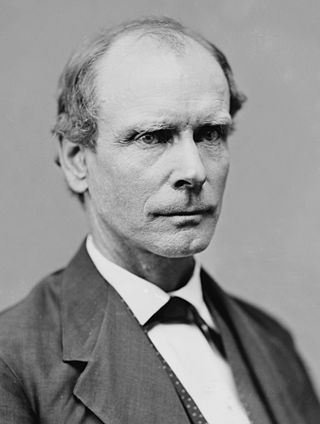
Amos Tappan Akerman was an American politician who served as United States Attorney General under President Ulysses S. Grant from 1870 to 1871. A native of New Hampshire, Akerman graduated from Dartmouth College in 1842 and moved South, where he spent most of his career. He first worked as headmaster of a school in North Carolina and as a tutor in Georgia. Having become interested in law, Akerman studied and passed the bar in Georgia in 1850; where he and an associate set up a law practice. He also owned a farm and enslaved eleven people. When the American Civil War broke out in 1861, Akerman joined the Confederate Army, where he achieved the rank of colonel.

Thaddeus Stevens was an American politician and lawyer who served as a member of the United States House of Representatives from Pennsylvania, being one of the leaders of the Radical Republican faction of the Republican Party during the 1860s. A fierce opponent of slavery and discrimination against black Americans, Stevens sought to secure their rights during Reconstruction, leading the opposition to U.S. President Andrew Johnson. As chairman of the House Ways and Means Committee during the American Civil War, he played a leading role, focusing his attention on defeating the Confederacy, financing the war with new taxes and borrowing, crushing the power of slave owners, ending slavery, and securing equal rights for the freedmen.

Amos Ellmaker was a U.S. politician, attorney, and judge from Pennsylvania. He served as the Pennsylvania Attorney General and was the Anti-Masonic vice presidential candidate in the 1832 presidential election.

Hiester Clymer was an American politician and white supremacist from the state of Pennsylvania. Clymer was a member of the Hiester family political dynasty and the Democratic Party. He was the nephew of William Muhlenberg Hiester and the cousin of Isaac Ellmaker Hiester. Although Clymer was born in Pennsylvania, he was adamantly opposed to Abraham Lincoln's administration and the Republican Party's prosecution of the American Civil War. Elected Pennsylvania state senator in 1860, Clymer opposed state legislation that supported the state Republican Party's war effort. After the American Civil War ended, Clymer unsuccessfully ran for the Pennsylvania Governor's office in 1866 on a white supremacist platform against Union Major-General John W. Geary. After his election to the U.S. House of Representatives in 1872 as a Democrat, Clymer would be primarily known for his investigation of Sec. William W. Belknap's War Department in 1876. Belknap escaped conviction in a Senate impeachment trial, and had resigned his cabinet position before being impeached by the House of Representatives. Having retired from the House in 1881, Clymer served as Vice President of the Union Trust Co. of Philadelphia and president of the Clymer Iron Co. until his death in 1884.
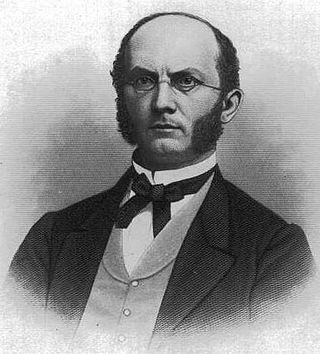
Isaac Ellmaker Hiester was a nineteenth century American political leader. A member of the Hiester Family political dynasty, he was also descended from the prominent Ellmaker family. The son of William Hiester, he was also a cousin of Hiester Clymer.

Passmore Williamson was an American abolitionist and businessman in Philadelphia, Pennsylvania, a free state in the antebellum years. As secretary of the Pennsylvania Anti-Slavery Society and a member of its Vigilance Committee, Williamson is best known for helping Jane Johnson and her two sons gain freedom from slavery on July 18, 1855.
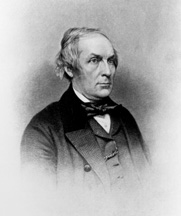
James Cooper was an American lawyer, soldier, and politician, who served in the United States Congress.
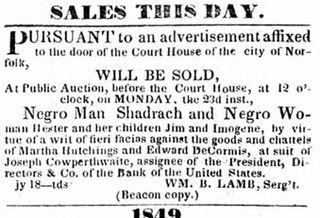
Shadrach Minkins was an African-American fugitive slave from Virginia who escaped in 1850 and reached Boston. He also used the pseudonyms Frederick Wilkins and Frederick Jenkins. He is known for being freed from a courtroom in Boston after being captured by United States marshals under the Fugitive Slave Act of 1850. Members of the Boston Vigilance Committee freed and hid him, helping him get to Canada via the Underground Railroad. Minkins settled in Montreal, where he raised a family. Two men were prosecuted in Boston for helping free him, but they were acquitted by the jury.
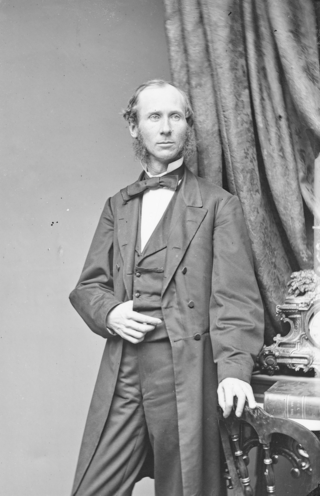
Edward McPherson was an American newspaper editor and politician who served two terms in the United States House of Representatives, as well as multiple terms as the Clerk of the House of Representatives. As a director of the Gettysburg Battlefield Memorial Association, he effected efforts to protect and mark portions of the Gettysburg Battlefield.
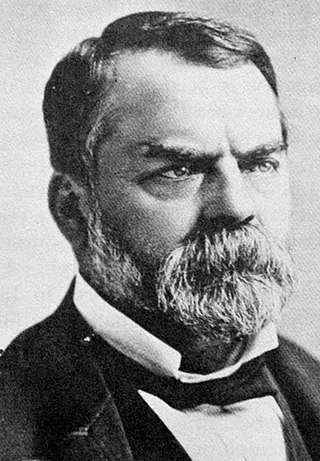
John Andrew Hiestand was an American politician from Pennsylvania who served as a Republican member of the U.S. House of Representatives from Pennsylvania.

Alexander Hamilton Coffroth was a Democratic member of the U.S. House of Representatives from Pennsylvania.
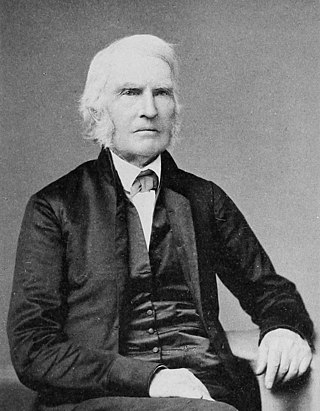
James Mott was a Quaker leader, teacher, merchant, and anti-slavery activist. He was married to suffragist leader Lucretia Mott. Like her, he wanted enslaved people to be freed. He helped found anti-slavery organizations, participated in the "free-produce movement", and operated an Underground Railroad depot with their family. The Motts concealed Henry "Box" Brown after he had been shipped from Richmond, Virginia in a crate. Mott also supported women's rights, chairing the Seneca Falls Convention in 1848. He spent four years supporting the establishment of Swarthmore College.
William Parker was an American former slave who escaped from Maryland to Pennsylvania, where he became an abolitionist and anti-slavery activist in Christiana. He was a farmer and led a black self-defense organization. He was notable as a principal figure in the Christiana incident, 1851, also known as the Christiana Resistance. Edward Gorsuch, a Maryland slaveowner who owned four slaves who had fled over the state border to Parker's farm, was killed and other white men in the party to capture the fugitives were wounded. The events brought national attention to the challenges of enforcing the Fugitive Slave Law of 1850.

The Tapeworm Railroad was a railway line planned by Congressman Thaddeus Stevens and nicknamed by opponents ridiculing a lengthy serpentine section around the Green Ridge of South Mountain after an orator compared the path to a tapeworm depiction on a product's packaging. Switchbacks were planned on the west slope at Hughs Forge along the E Br Antietam Creek and on the east slope at Stevens' 1822 Maria Furnace along Toms Creek, with 3 east slope tunnels through spurs of Jacks Mountain.

Lydia Hamilton Smith was the long-time housekeeper of Thaddeus Stevens and a prominent businesswoman after his death.
William Hiester Jr. was an American politician from Pennsylvania who served as an Anti-Masonic member of the United States House of Representatives for Pennsylvania's 4th congressional district from 1831 to 1837.

The Christiana Riot, also known as Christiana Resistance, Christiana Tragedy, or Christiana incident, was the successful armed resistance by free Blacks and escaped slaves to a raid led by a federal marshal to recover four escaped slaves owned by Edward Gorsuch of Maryland. The raid took place in the early morning hours of September 11, 1851, at the house in Christiana, Pennsylvania, of William Parker, himself an escaped slave. This took place after the federal Fugitive Slave Act of 1850 increased penalties for assisting escaped slaves and required state government officials, even in free states such as Pennsylvania, to assist in the recapture of slaves.

Susannah Augusta Maxwellnée Stokes was a prominent Black citizen of Richmond Hill, Ontario, Canada, in the 19th and early 20th centuries.

Colonel Peter Clarkson Ellmaker was an officer in the United States and Union armies, before, during and after the American Civil War.